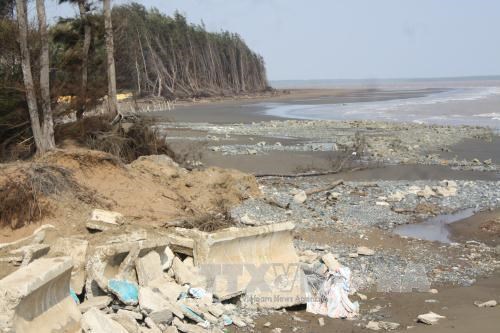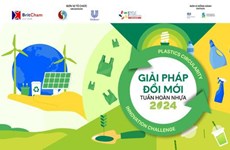Tra Vinh to relocate 700 erosion-affected households
The Mekong Delta province of Tra Vinh will need about 280 billion VND (12.32 million USD) to move approximately 700 households from erosion-prone areas to safe places from 2018 – 2020.
 A sea dyke in the Mekong Delta province of Tra Vinh is affected by erosion. (Photo: VNA)
A sea dyke in the Mekong Delta province of Tra Vinh is affected by erosion. (Photo: VNA)Tra Vinh (VNA) – The Mekong Delta province of Tra Vinh will need about 280 billion VND (12.32 million USD) to move approximately 700 households from erosion-prone areas to safe places from 2018 – 2020.
Of the amount, over 247 billion VND (10.86 million USD) will be spent on six new resettlement projects, accommodating over 450 affected families in Hoa Minh commune (Chau Thanh district), Long Vinh commune (Duyen Hai district), My Long Bac and Vinh Kim communes (Cau Ngang district), Duc My commune (Cang Long district) and Dinh An commune, Tra Cu district, according to the provincial Department of Agriculture and Rural Development.
The province is seeking to relocate 42 households in high-risk areas in Vam Ben Tranh village, Dinh An commune as soon as possible.
The remaining fund will be budgeted for three existing projects in Duyen Hai, Chau Thanh and Cang Long districts.
The complexity of extreme weather and climate change has put coastal areas and lands on the banks of rivers and canals in Tra Vinh at high risk of erosion, said Deputy Director of the provincial Department of Agriculture and Rural Development Huynh Kip No.
The department has proposed the provincial People’s Committee to consider additional public investment for urgent resettlement projects from now to 2020.
The erosion of land along coasts and rivers has occurred in many parts of the Mekong Delta, including Tra Vinh, for many years. It has affected cultivation and the lives of millions of residents living in the province’s erosion-prone areas.
Erosion and sea water intrusion are expected to become more severe. Experts forecast that the delta would lose 39 percent of its area to the sea if the sea level rises by 100cm by 2100.
Since 2012, Tra Vinh has invested more than 107 billion VND (4.7 million USD) to support over 2,000 people living in high-risk areas, mostly by helping them move to safe places, receive vocational training and shift to new plants and animals that are more adaptive to local conditions.-VNA













